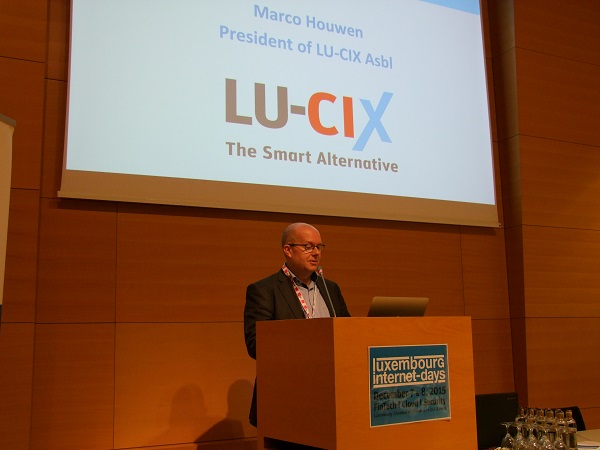
Marco Houwen, entrepreneur and partner at DHS Services in Luxembourg, introduced Day 2 of the 2015 Luxembourg Internet Days, of whcih Day 1 focued on FinTech, and Day 2 to examine Cloud and Security issues; again, as on Day 1, there was a shortage of seating as many attendees late in arriving had to make do with standing room only.
Addressing the issue of the state of the Internet in Luxembourg, Marco Houwen stated threre are three issues: firstly, we are currently working out how we can meet the needs of the users; secondly, the SnT is addressing the issue of security. He said that we need an Internet industry whose leaders look beyond the classical way. He also stated that LU-CIX is an independent carrier with 60 members with traffic peaks of 42 Gbits; the organisation is looking at ways to expand and with whom to partner for future growth.
Carlo Thelen, Diretcor at the Chambre de Commerce, stated that Luxembourg has the ambition of a major Internet hub and has welcomed the arrival of new players who have developed new niches in a rapidly-changing environment. The sector is thriving and growing at around 11% annually, representing 7.3% GDP. He said that 40% of SMEs in the EU use the Internet as a sales channel, with the lack of adoption linked directly to a skills gap. He referred to the newly-launched House of Training as well as other initiatives Luxembourg aims to launch in the future to provide education and training to address this skills gap, with the House of Entrepreneurship to address innovation. He also said that the Chambre de Commerce will support the setting of of a new House of FinTech. "The future of services will be digital" was his concluding statement.
Luxembourg's Prime Minister and Minister for Communications and Media, Xavier BEttel, said that Luxembourg is changing from an IT nation to a digital nation. He thanked the regulator to be open and modern, which is also relevant for the Nation Branding initiative. He said that trust in rules in which we operate, is important. He siad that citizens should need to provide information just one, with different administrations being able to access and follow this information. The Digital for Education action plan launched this May addresses education in schools. He also complemented the initiative of the private sector to address training initiatives.
PM Bettel said that the Internet is about infrastructure, data and access. He gave the example of a new law that will mean that all new tall buildings built will need to provide high-speed Internet on all floors, not just near the bottom. He said that Tier IV datacentres are not the end solution but must be used as an argument to attract new business.
On the EU Presidency, he referred to the data economy and the recent EU Data Forum and the ongoing reform of data protection laws, admitting that finding a common set of rules across the EU is difficult. He listed a number of meetings and initiatives to take place over the coming weeks and months.
He also referred to LU-CIX and stated that it will become more critical in the years to come as a cross-industry initiative and will support it in its next stage of development.
Photos by Geoff Thompson








